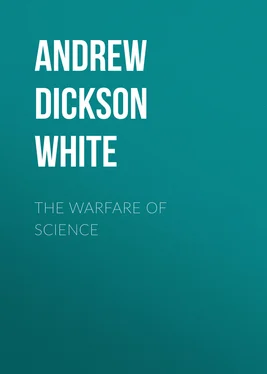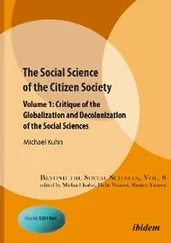Andrew Dickson White - The Warfare of Science
Здесь есть возможность читать онлайн «Andrew Dickson White - The Warfare of Science» — ознакомительный отрывок электронной книги совершенно бесплатно, а после прочтения отрывка купить полную версию. В некоторых случаях можно слушать аудио, скачать через торрент в формате fb2 и присутствует краткое содержание. Жанр: foreign_prose, foreign_religion, Философия, foreign_psychology, foreign_antique, на английском языке. Описание произведения, (предисловие) а так же отзывы посетителей доступны на портале библиотеки ЛибКат.
- Название:The Warfare of Science
- Автор:
- Жанр:
- Год:неизвестен
- ISBN:нет данных
- Рейтинг книги:5 / 5. Голосов: 1
-
Избранное:Добавить в избранное
- Отзывы:
-
Ваша оценка:
- 100
- 1
- 2
- 3
- 4
- 5
The Warfare of Science: краткое содержание, описание и аннотация
Предлагаем к чтению аннотацию, описание, краткое содержание или предисловие (зависит от того, что написал сам автор книги «The Warfare of Science»). Если вы не нашли необходимую информацию о книге — напишите в комментариях, мы постараемся отыскать её.
The Warfare of Science — читать онлайн ознакомительный отрывок
Ниже представлен текст книги, разбитый по страницам. Система сохранения места последней прочитанной страницы, позволяет с удобством читать онлайн бесплатно книгу «The Warfare of Science», без необходимости каждый раз заново искать на чём Вы остановились. Поставьте закладку, и сможете в любой момент перейти на страницу, на которой закончили чтение.
Интервал:
Закладка:
But the opposing powers were too strong. In 1615 Galileo is summoned by the Inquisition to Rome, and the mine, which had been so long preparing, was sprung. Pope Paul V. and the cardinal inquisitors order eleven theologians of the Inquisition to examine these two propositions which had been extracted from Galileo's letters on the solar spots: First , that the sun does not move about the earth; secondly , that the earth does move about the sun. The eleven theologians solemnly considered these points, and in about a month rendered a solemn decision that "the first proposition, that the sun is the centre, and does not revolve about the earth, is foolish, absurd, false in theology, and heretical, because expressly contrary to Holy Scripture; and that the second proposition, that the earth is not the centre, but revolves about the sun, is absurd, false in philosophy, and, from a theological point of view, at least opposed to the true faith ." 49 49 See the original documents in Epinois , pp. 34-36. Martin's translation does not seem exactly correct.
The pope himself, Paul V., now intervenes; he orders that Galileo be brought before the Inquisition. Then the great man of science in that age is brought face to face with the greatest theologian: Galileo is confronted by Cardinal Bellarmin. Bellarmin shows Galileo the error of his opinion, and orders him to renounce it. De Lauda, fortified by a letter from the pope, ordering the astronomer to be placed in the dungeon of the Inquisition should he refuse to yield, commands him to " abandon entirely the opinion that the sun is the centre of the universe, and that the earth moves , and to abstain from sustaining, teaching, or defending that opinion in any manner whatever, orally or by writing." 50 50 See full official text in Epinois .
Galileo bowed to this order, was allowed to retire, and the whole proceeding was kept secret.
About ten days later, on March 5, 1616, the Congregation of the Index, moved thereto, as we have seen, and as the letters and documents now brought to light show, by Pope Paul V., solemnly rendered their decree: that the doctrine of the double movement of the earth about its axis and about the sun is false and entirely contrary to Holy Scripture ; that this opinion must neither be taught nor defended. The same decree condemned the writings of Kopernik, and all writings which affirm the motion of the earth . The great work of Kopernik was interdicted until corrected in accordance with the views of the Inquisition; and the works of Galileo and Kepler, though not mentioned by name, were included among those implicitly condemned as "affirming the motion of the earth."
The condemnations were inscribed upon the Index , and to the Index was prefixed the usual papal bull giving its monitions the papal sanction. To teach or even read the works denounced or passages condemned, was to risk persecution in this world and damnation in the next. Human science had apparently lost the great decisive battle.
For some time Galileo remained at Rome perfectly submissive. 51 51 See proofs of this in Martin . The reader should be reminded that the archives exposed within the past few years have made the statements of early writers untrustworthy on very many of the nicer points.
Pope Paul V. petted him, and all seemed happy in the ending of the long war.
But, returning to Florence, something of his old scientific ardor stirred within him; and at last Cardinal Barberini, who had seemed liberal and friendly, having been made pope under the name of Urban VIII., Galileo conceived new hopes, and again in a published work alluded favorably to the Copernican system. New troubles ensued. Galileo was induced to visit Rome again, and Pope Urban tried to cajole him into silence, and personally took the trouble to try to show the astronomer his errors by argument. Other opponents were less considerate. Works appeared attacking his ideas—works all the more unmanly, since their authors knew how Galileo was restrained by force from defending himself; and, as if to accumulate proofs of the fitness of the Church to take charge of advanced instruction, his salary as professor at the University of Pisa was taken from him. Sapping and mining began. Just as the Archbishop of Pisa some years before had tried to betray Galileo with honeyed words to the Inquisition, so now Father Grassi tried it; and after various attempts to draw him out by flattery, suddenly denounced his scientific ideas as "leading to a denial of the real presence in the Eucharist."
And here science again loses ground. Galileo had announced his intention of writing upon the theory of the tides, but he retreated, and thus was lost a great treatise to the world.
For the final assault, the park of heavy artillery was at last wheeled into place. You see it on all the scientific battle-fields. It consists of general denunciation; and Father Melchior Inchofer, of the Jesuits, brought his artillery to bear well on Galileo with this declaration: that the opinion of the earth's motion is, of all heresies, the most abominable, the most pernicious, the most scandalous; that the immobility of the earth is thrice sacred; that argument against the immortality of the soul, the Creator, the incarnation, etc., should be tolerated sooner than an argument to prove that the earth moves. 52 52 See Inchofer's Tractatus Syllepticus , cited in Galileo's letter to Deodati, July 28, 1634.
But this state of things could not be endured forever. Urged beyond forbearance, Galileo prepares a careful treatise in the form of a dialogue, exhibiting the arguments for and against the Copernican and Ptolemaic systems. He then offers to submit to any conditions the Church tribunals may impose, if they will but allow it to be printed. At last they consent, imposing the most humiliating condition of all, which was a preface written by Father Ricciardi and signed by Galileo, in which the whole work was virtually exhibited as a play of the imagination, and not at all as opposed to the truth laid down in 1616 by the Inquisition.
The new work met with prodigious success; it put new weapons into the hands of the supporters of the Copernican theory. The preface only embittered the contest; it was laughed at from one end of Europe to the other as ironical. This aroused the enemy. The Jesuits, Dominicans, and the great majority of the clergy, returned to the attack more violent than ever; and Pope Urban VIII., his personal pride being touched, after some halting joined the clerical forces.
The first important piece of strategy was to forbid the sale of the work; but the first edition had already been exhausted and spread throughout Europe. Urban now became angry, and both Galileo and his works were placed in the hands of the Inquisition. In vain did the good Benedictine Castelli urge that Galileo was entirely respectful to the Church; in vain did he say that "nothing that could be done could now hinder the earth from revolving." He was dismissed, and Galileo was forced to appear in the presence of the dread tribunal without defender or adviser. There, as was so long concealed but as is now fully revealed, he was menaced with torture by express order of Pope Urban, and, as is now thoroughly established by documentary evidence, forced to abjure under threats, and subjected to imprisonment by command of Urban, the Inquisition deferring in the most servile manner to the papal authority.
The rest of the story the world knows by heart; none of the recent attempts have succeeded in mystifying it. The whole world will remember forever how Galileo was subjected certainly to indignity and imprisonment equivalent to physical torture; 53 53 It is not probable that torture in the ordinary sense was administered to Galileo, though it was threatened. See Th. Martin , Vie de Galilée , for a fair summing up of the case. For text of the abjuration, see Epinois ; also, Private Life of Galileo , Appendix.
how he was at last forced to pronounce publicly, and on his knees, his recantation as follows: "I, Galileo, being in my seventieth year, being a prisoner and on my knees, and before your eminences, having before my eyes the Holy Gospel, which I touch with my hands, abjure, curse, and detest the error and the heresy of the movement of the earth."
Интервал:
Закладка:
Похожие книги на «The Warfare of Science»
Представляем Вашему вниманию похожие книги на «The Warfare of Science» списком для выбора. Мы отобрали схожую по названию и смыслу литературу в надежде предоставить читателям больше вариантов отыскать новые, интересные, ещё непрочитанные произведения.
Обсуждение, отзывы о книге «The Warfare of Science» и просто собственные мнения читателей. Оставьте ваши комментарии, напишите, что Вы думаете о произведении, его смысле или главных героях. Укажите что конкретно понравилось, а что нет, и почему Вы так считаете.












